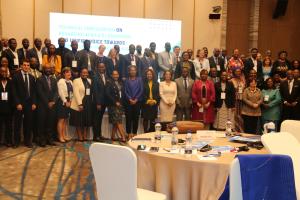African health leaders begin work on roadmap to reshape global health financing on the continent
Addis Ababa – More than 80 ministry of health experts, regional and global partners and civil society representatives have set in motion the development of a roadmap to catalyse action to reshape the health financing ecosystem in Africa, and make it fit-for-purpose towards 2030 and beyond.
The meeting was convened by the World Health Organization’s (WHO) Regional Office for Africa, in partnership with the African Centres for Disease Control and Prevention (Africa CDC) and the African Constituency Bureau of the Global Fund.
The development of the roadmap marks an important step in the ongoing process of identifying ways to ensure that global health initiatives (GHIs) and other external funding partners are more effective, efficient and equitable in complementing domestic financing, to strengthen health system capacities, accelerate progress towards universal health coverage (UHC), and deliver health impact.
Over the past two decades, GHIs such as Gavi, the Global Fund and the Global Financing Facility have contributed to enormous progress in protecting health and improving lives of people in Africa and across the world. However, important changes in health needs, financing and governance necessitate a renewed vision for how they support countries to deliver sustainable impact.
“With the growing need for strong and resilient health systems that can adapt to emerging threats, while continuing to meet existing health needs, the imperative of optimizing the impact of available resources is becoming increasingly urgent to advance Africa towards universal health coverage,” said Dr Matshidiso Moeti, WHO’s Regional Director for Africa.
Focusing on GHIs as an entry point and catalyst for change in the broader health financing ecosystem, the Lusaka Agenda, published on UHC Day on 12 December 2023, represented the culmination of a 14-month, multi-stakeholder process that captured consensus around five strategic shifts for the long-term evolution of GHIs. The roadmap for the implementation of the Lusaka Agenda implementation in Africa will set out priority actions to realize these shifts.
“At the 37th African Union (summit in February, African leaders endorsed the establishment of an accountability mechanism within the AU architecture to ensure effective implementation of the Lusaka Agenda on the continent. Our discussions over the past two days began to give shape to what this might look like,” said Dr Jean Kaseya, Director-General of Africa CDC.
The draft roadmap will be refined over the coming months, before it is presented for consideration by ministers of health at the WHO Regional Committee for Africa, to be held in Brazzaville, Congo, in August this year.
“The Lusaka Agenda will ensure long-term sustainability and will propel countries towards achieving UHC,” said Dr Patrick Kuma-Aboagye, Director-General of the Ghana Health Service, and co-chair of the Lusaka Agenda Working Group.
To deliver more sustainable impact in the face of emerging threats such as climate change and conflicts, the key shifts highlighted in the Lusaka Agenda include a focus on strengthening primary health care by bolstering health systems, catalysing action on domestic financing, improving joint approaches to achieving health equity, and strategic and operational coherence among GHIs. The Lusaka Agenda also calls for improved coordination of approaches to products, reseach and development (R&D) and regional manufacturing, to address market and policy failures in global health.
“The Lusaka Agenda is now moving from talk to action, led by countries, and GHIs are listening,” added Linda Mafu, the Global Fund’s head of Civil Society and Political Advocacy.



